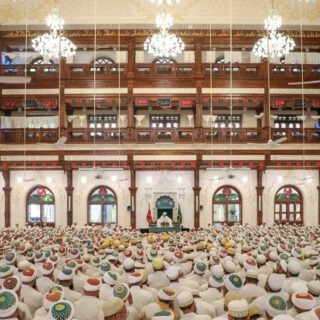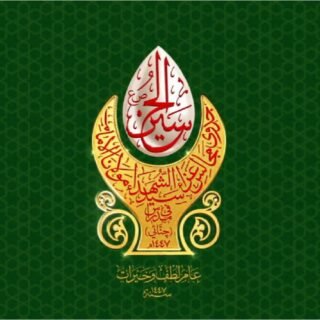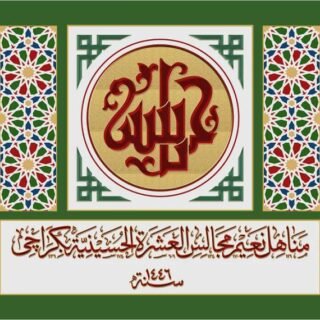From the dawn of time to the end of this world Allah has created for each age and era his representative on earth who guides mankind towards the path of salvation. As Allah says in Quran, “There is a Ilaah (lord) in the sky; and there is a lord on the earth.” There has always been a Maula and there always will be. He may be the Nabi, or the Wasi, or the Imam. And when the Imam is in seclusion, when he doesn’t wish to remain among people due to hikmat, it is the Dai to whom he entrusts his Dawat and the Mumineen, the children of his Dawat. The Dai-al-Mutlaq’s position is exalted by the fact that the Imam has seated him on his own seat, in his own cabin. The word ‘Mutlaq’ means ‘having absolute authority.’ The Dai al Mutlaq has absolute authority to appoint his successor at his discretion with the guiding light of ilhaam and ta’aeed which are always connected with him. The Dai’s Valayat (love) and his Ta’at (obedience) are compulsory and are connected with the Valayat and Ta’at of the Imam and the Nabi. The Dai-al-Mutlaq is infallible like the Imam. Whatever he does or says is absolute truth which true believers never doubt or contest.
When the Imam in the progeny of Rasuluallah (SAW) goes into seclusion, his Dawat (mission) is ever present with the presence of the Dai-al-Mutlaq, and under him and assisting him, Mazoon and Mukasir. These two positions are controlled by the position of Dai-al-Mutlaq. Whilst the position of Dai-al-Mutlaq is a necessary proof of the existence of the Imam, the other two positions are not necessarily so. While the absence of the Dai, even for a fraction of a second, is inconceivable, the appointment of a Mazoon and Mukasir is solely the right of the Dai, which he may or may not exercise. There have been many instances in the history of Dawat when a Mazoon had passed away and the position remained vacant for a period of time. One such example is narrated by the 52nd Al-Dai-al-ajal Syedna Mohammed Burhanuddin (RA), “O Mumineen, today is the day of Ashura, and I reiterate that the presence of Dai al Asr is sufficient even if no other hudood exist, as he is the master of all and the existence of Dawat is due to him. During the time of Maulana Abdullah Badruddin (RA) his Mazoon Ajal, Syedi Ismailji bhai saheb Badruddin died in Surat. Syedi Ismailji died in Shehre Ramadan, and for the next ten months Maulana did not appoint any one Mazoon, till the 27th of Rajab, when he appointed Dawood bhai Saheb as Mazoon. Many people objected to the absence of Mazoon for such a long period of time. Didn’t they know that if the Dai is present then everything is present? The Dai’s position encompasses the positions of Mazoon and Mukasir.”
In the seclusion of the Imam, the Dai is the ultimate authority. The responsibility and the burden he bears are enormous. Syedna Mohammed Burhanuddin (RA) says, “Syedi Shaikh Adam Safiuddin, eldest of all brothers, the son of Syedna Abdut taiyeb Zakiuddin (RA) was the Mazoon. He was of exalted status; however, every Mazoon doesn’t become a Dai. Only the Dai can bear these enormous burdens with the succour of Allah.” It is evident from the history that not every Mazoon has become a Dai, nor has every Dai who was appointed by nas previously held the position of Mazoon. When Syedna Abdullah Badruddin (RA) performed nass on Syedna Taher Saifuddin (RA) the latter, at that time, was neither a Mazoon nor a Mukasir. In the beginning of satr, during the time of the third Dai, Syedna Hatim (RA), Syedna Ali bin Mohammed al Waleed was his mazoon and the one to whom Syedna Hatim (RA) had not only entrusted the education and upbringing of his own son, but had also decided to appoint him as his successor. When Syedna Ali came to know about it, he pleaded Syedna Hatim (RA) to appoint his own son instead, stating that his son had equalled him in all virtues and had an added distinction: he was the Dai’s son; and he cited from the Quran that “blood relations are more worthy each of the other.” Syedna Hatim (RA) accepted his plea and performed nass on his son Syedna Ali bin Syedna Hatim (RA) with the Ilhaam of Imam (AS).








